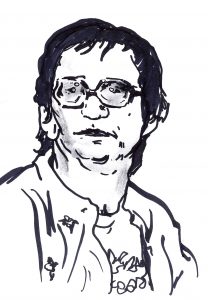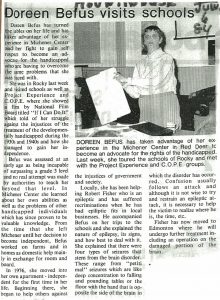The Personal is Political
 By late 1977, although she had only been living in the community for approximately one year, Doreen’s self-perceptions were changing rapidly and her experiences as a “handicapped” individual had become a critical element of her identity. Her diary grew more and more reflective on the subjects of ability, the right to education, and the value of different kinds of social contributions. She came to question the limitations that had been placed upon people like herself who had been sent to institutions and restrained from engaging in a variety of mainstream experiences.
By late 1977, although she had only been living in the community for approximately one year, Doreen’s self-perceptions were changing rapidly and her experiences as a “handicapped” individual had become a critical element of her identity. Her diary grew more and more reflective on the subjects of ability, the right to education, and the value of different kinds of social contributions. She came to question the limitations that had been placed upon people like herself who had been sent to institutions and restrained from engaging in a variety of mainstream experiences.
This progression from a deinstitutionalized patient to a more confident empowered activist unfolded over the twelve years that she resided in her basement suite. She was politicised by both positive and negative interactions with local organizations and families, including her own. She worked with family seeking domestic support and did volunteer work with ex-patients who, like herself, were prevented from starting their own families and who struggled to adjust a semi-independent life outside the provincial institutional system. Both these experiences were significant influences on her emerging political perspective. Shortly after she had been transferred out of the group home, she wrote: “I have gotten to know a lot about myself through the way that other people would never would have taken the time to help me with my problems years ago. It has been good getting to know just how much we can learn more about ourselves.”
Over the course of her writings in the late 1970s and through the 1980s, she adopted the habit of referring to deinstitutionalized and disabled individuals as “handicappis.” She identified herself as a handicappi, and used the term with pride. Although it usually denoted some kind of mental or physical deficit, Doreen said that any such deficit could and usually was overcome with a wealth of abilities in other areas. She, for example, prided herself on her abilities to help others, connecting single mothers or deinstitutionalized residents with social workers, cooking meals for her friends, and increasingly, writing letters that attracted media attention and helped to raise awareness about the diversity of abilities within the Red Deer community.

This change in language marked a growing political, and even radical perspective on the rights of “disabled” individuals. In 1981 she wrote a letter to the University of Alberta forcefully asserting that the “disabled are abled,” and declaring that the “disabled are considering themselves consumers and are willing to show [what] they can do for themselves.” Doreen thus joined a transnational trend in disability rights movements that insisted upon a “people first” perspective in which the individual took precedence over their disability. In a letter to the editor about the poor attendance of inter-denominational clergy at a conference the church and people with disabilities, Doreen lamented that “some clergy have an offensive patronizing attitude which discouraged handicappi people from going to church.” Doreen spoke at this meeting about the time she had spent at the Michener Centre, the lack of spiritual lessons in that environment, followed by a virtual shunning of “handicappi” people from churches in the Red Deer community. “God accepts these people as people first and handicapped second, why can’t we do the same?” These kinds of public appearances and memorable appeals clearly left an impression on others, but also reinforced Doreen’s own convictions as she continued to write letters to a wider circle of readers and to speak to a variety of community groups.
By the early 1980s Doreen’s writings had attracted attention from others in similar conditions. In 1981 she received a letter from a woman in Newfoundland who thanked Doreen and subsequently shared her own experiences. “I was told that I have a learning disability, but I am not letting that stand in my way of doing the things that make me feel good about myself. . . .We have to be strong and fight back with courage and perseverance when anyone tries to discourage us from doing something that will help us help ourselves.” Letters arrived from as far away at Blackpool, UK, from a woman who said she was severely disabled and proud of the fact that she had learned to play the drums and was now in a percussion band. And letters arrived from Alberta, including one from parents of disabled children seeking Doreen advice.

In 1981 Doreen’s work and activism captured the attention of local filmmakers who produced a 25-minute documentary that centred on the life and experiences of Doreen Befus. The film, “If I Can Do It, You Can Do It,” featured a number of former residents of the Michener Centre, but zeroed in on Doreen’s experiences, which had culminated in a life of independence, activism and community service. The film dealt with eugenics and the forced sterilization that Doreen and others endured. “They’d just send you up there and you’d have no say in it,” Doreen told newspaper interviewers concerning her meeting with the Eugenics Board at age 18. The film attracted more media attention and triggered a speaking tour for Doreen in which she visited Alberta’s secondary schools and spoke to students about the value of education, the People First movement,and the sting of discrimination.
For more details on Doreen’s history, you can read a full chapter based on her life in Erika Dyck, Facing Eugenics: Reproduction, Sterilization, and the Politics of Choice, published by the University of Toronto Press in 2013.
